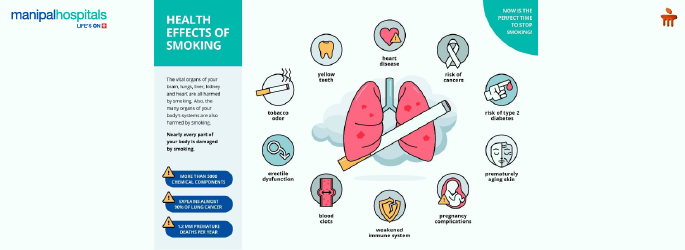
Smoking cigarettes is one of the most harmful habits that a person can have. It's not only detrimental to the person who smokes, but it also affects the people around them. Smoking cigarettes can have serious consequences for your lungs. Here's how: The smoke from a cigarette contains over 4,000 chemicals, including tar, carbon monoxide, and nicotine. When you inhale cigarette smoke, these chemicals are absorbed into your lungs, which can cause damage over time. The tar in cigarette smoke is particularly harmful because it can build up in the lungs and cause inflammation, leading to a decreased ability to breathe. Smoking cigarettes also damages the air sacs in your lungs, which are responsible for exchanging oxygen and carbon dioxide. Over time, this damage can lead to emphysema, a chronic lung disease that makes it difficult to breathe. Additionally, according to the top pulmonologists in Bangalore, lung diseases caused by smoking can cause chronic bronchitis, which is characterised by a persistent cough and excess mucus production. One of the most serious consequences of smoking is an increased risk of lung cancer.
According to the WHO, about 80% of lung cancer deaths are caused by smoking. This risk increases with the number of cigarettes smoked per day and the duration of smoking. Smoking cigarettes can have a significant impact on your lungs and overall health. Quitting smoking is the best thing you can do for your lungs and your overall well-being. If you're a smoker, talk to your doctor about strategies to quit smoking and improve your lung health.
How Does Smoking Affect Your Lungs?
Your lungs are responsible for giving oxygen to all of your body's cells. All of your body's cells and organs rely on oxygen. If you don't obtain enough clean oxygen, you're more likely to acquire illnesses and diseases, including cancer. Oxygen is required for energy, a good mood, and effective brain function. It can also improve your stamina, strengthen your immune system, and reduce stress and concern. Smoking can cause lung tissue damage and impede pulmonary function. Furthermore, it may prevent your lungs from giving adequate oxygen to your cells and essential organs.
According to the FDA, each cigarette puff contains over 7,000 hazardous chemicals. These drugs can irritate your throat, injure your lungs, and constrict your lungs' airways. As a result of all of these repercussions, you may find it more difficult to breathe. Fortunately, once you quit smoking, your risk for these issues decreases over time, and you'll have fewer ailments.
What Lung Complications Are Caused by Smoking?
Emphysema, COPD, and lung cancer are among the lung disorders made more likely by smoking. Tobacco usage is estimated to be the primary cause of 80 per cent of COPD cases. Furthermore, smokers have a 20-fold higher risk of lung cancer than non-smokers.
Smoking can increase the risk of acquiring other cancers. This group includes cancers of the larynx (voice box), trachea (windpipe), bronchus (airway to the lungs), and oropharynx (the entire back section of the mouth).
Cigarette smoking is the leading preventable cause of death in India. It kills one out of every five men and women. Smoking raises the risk of coronary heart disease and stroke by two to four times, as well as contributing to a variety of cancers. In addition to numerous other difficulties, smoking has been linked to fertility issues, tooth loss, and diabetes.
What are the Benefits of Quitting Smoking?
The benefits of quitting smoking are numerous. When one ceases, one will notice that the quality of life has improved.
Food will start to taste better, and your sense of smell will return gradually. You'll also start to smell better to folks who are sensitive to the stench of cigarette smoke.
Smoke can make you smell bad because it sticks to your hair and clothes and causes bad breath. Quitting smoking may make you appear more attractive by preventing the yellowing of your teeth and nails, as well as the appearance of your skin and hair. You won't need to take as many breaks at home or work to go outside and smoke because you'll feel more invigorated and less tired.
FAQs
-
What are the 5 effects of smoking?

Tobacco usage harms practically all of the body's organs and produces illness and impairment. For every smoker who dies, at least 30 people suffer from a serious smoking-related ailment. Smoking increases the risk of acquiring cancer, heart disease, stroke, lung diseases, diabetes, and chronic obstructive pulmonary disease (COPD) in addition to emphysema and chronic bronchitis. Smoking also increases the risk of acquiring tuberculosis, a variety of eye diseases, and immune system problems such as rheumatoid arthritis.
-
Can Lungs Heal After Smoking?
When you stop smoking, your lungs immediately begin to mend, so quitting sooner rather than later can enhance your overall health. Quitting smoking is one of the best things you can do for your overall health. Because your lungs are self-cleaning, they will gradually recover and rebuild themselves once you stop smoking. The time it takes for the lungs to fully heal varies by individual. In addition, there are several lifestyle changes you may make to help your lungs heal faster. Visit the top lungs specialist hospital in Bangalore for expert advice.
-
How can I Clean my Lungs After Smoking?
One of the most effective ways to maintain and promote optimal lung health is to consult with a doctor, who can detect any respiratory problems and provide a personalised treatment plan. If you've recently quit smoking or simply want to promote good respiratory health, you might be interested in learning how to naturally clear your lungs. Cleaning your lungs is surprisingly easy; there are a variety of self-care practices and lifestyle changes that can help the lungs' natural ability to remove daily toxins.
-
Can Lungs Heal after 40 Years of Smoking?
Even while lung tissue cells can regenerate, a smoker cannot acquire the lungs of a non-smoker. They will always have some physical evidence of their smoking habits at best, and certain respiratory difficulties at worst.





















 4 Min Read
4 Min Read













